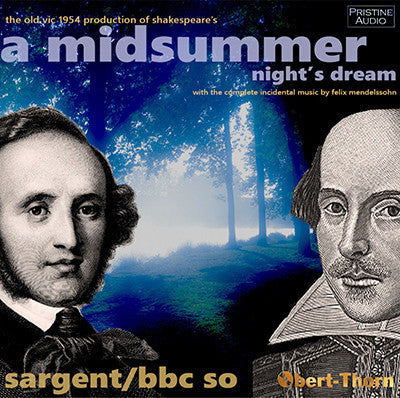This is the 1954 recording of the bulk of Shakespeare’s magical play; it was issued on HMV and RCA Victor (ALP 1262/4 and LM-6115), and Andrew Rose has taken the best parts of two American RCA pressings. The play itself has act IV, scene 2 omitted in its entirety and there are various other small cuts; it represents the 1954 Old Vic production, which subsequently toured to the USA. The orchestral segments were recorded in July of that year, the actors the next month, both at Abbey Road.
The Overture is heard in a performance of miraculous lightness, the upper strings impeccably disciplined. Mark Obert-Thorn’s transfer has great presence. How wonderful to hear “Now, fair Hippolyta, our nuptial hour” after the final woodwind chords of the Overture; spoken voices are closely recorded but the text (poetry, really) is excellently delivered; Michael Benthall is credited as “theatre director.” The little snippets of music one hears throughout add a different dimension to the play, a mix of centuries (Shakespeare’s, and Mendelssohn’s) that is most appealing; all are delivered with the utmost care. The concluding brief segment to act I scene 2 leads in well to the famous Scherzo, itself in perhaps not the crispest rendition, but one that certainly has enthusiasm on its side. Sargent’s “Wedding March” has grandeur and pomp galore, an impression that stretches over the wonderfully interior central section.
The obvious point of comparison here is Klemperer’s 1960 Philharmonia recording (with Janet Baker and Heather Harper in “You spotted snakes,” surely the highlight of the lesser-known incidental music here.) Klemperer’s band is more disciplined than the BBC orchestra (the Scherzo, for example), but arguably Sargent generally has the last iota of character in his favor. That said, Sargent’s “You spotted snakes” is a little lackluster, despite an attractive central lullaby chorus (and the vocal soloists are not credited, a shame as they are excellent singers).
Sargent’s act III Intermezzo is wonderfully impulsive and urgent. Perhaps the recording is a touch over-resonant for the detail to come through when the lovely cello melody steps forward, but there is character aplenty here. Lovely to hear, too, how the horn calls of the Nocturne are pre-empted during the course of the dialogue. The performance of the Nocturne proper is lovely, taken at quite a mobile pace, with eloquent horns to the fore and the strings in the central panel captured in both recording and transfer with a lustrous sheen. The “Dance of the Clowns,” with its imitation of the braying of a donkey/ass, is blessed with appropriately rustic accentuation from the strings; the rather backwardly placed clarinet manages still to impart much joy. The final, gently pointed fairy chorus “Through the house give glimmering light” is magnificently done (again, better vocal soloists would have sealed the deal).
The spoken cast includes Moira Shearer as Titania, Robert Helpmann as Oberon, Stanley Holloway as Bottom and Patrick Macnee (of Avengers fame) as an excellent Demetrius. Shearer’s “Come now, a roundel and a fairy song” is beautifully delivered, inviting in “You spotted snakes” deliciously. Perhaps Anne Walford’s Hermia savors a touch of an English girls’ boarding school, but one does hear her fears for Lysander in her scene with Demetrius (act III, scene 2). Anthony Nicholls is a resonant voiced Theseus. A fine selection of Mechanicals offers plenty of entertainment in the final stage of the evening with their Pyramus and Thisbe; the presence of an orchestra enables a trumpet and drum fanfare before the Prologue of Pyramus and, my word, how silly are some of the voices we hear in this insert! Puck’s final speech, delivered over the strains of the orchestra, is magical indeed.
A wonderful release, and surely one of the brightest jewels in Pristine’s ever-expanding catalog.
Colin Clarke
This article originally appeared in Issue 40:2 (Nov/Dec 2016) of Fanfare Magazine.


